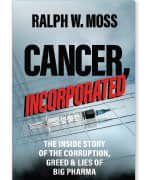Life Extension Magazine®
Dr. Ralph Moss is a renowned investigative medical journalist who has been exposing corruption within the cancer industry for over 40 years.

While working at Memorial Sloan-Kettering Cancer Center in the 1970s, he blew the whistle when the favorable results of a plant-based substance were covered up.
He was promptly fired.
Since that time, Moss has written 12 books and countless articles, and been featured on radio, webcasts, and TV shows, including “60 Minutes.”
In his latest book, Cancer, Incorporated, Moss is once again calling attention to the corruption and lies that are the true “cancer” in the cancer industry, including the “revolving door” that exists between “Big Pharma” and the FDA.
He reveals the inside story of how the pharmaceutical industry has managed to manipulate every aspect of drug development and has bought and paid for good opinions about mediocre drugs by key oncology leaders.
He also provides evidence of how Big Pharma has paid millions to doctors to downplay drug side effects and play up non-existent benefits in rigged clinical trials.
In this interview with Life Extension®, Moss discusses how Big Pharma has hijacked the clinical-trial system, resulting in a flood of unproven, highly toxic, and outrageously priced drugs that have little to no benefit for the average patient.
—Laurie Mathena
LE: Are we making progress in the war against cancer?
Dr. Moss: We are told that steady progress is being made. In particular, it is said that the current system is producing effective ‘targeted’ drugs almost every day. New drugs are bringing a supposed “world without cancer” into view.
This is wishful thinking.
In fact, there is massive deception and manipulation underway, to convince us that steady progress is being made.
This is to get us to continue to consume—in fact, to demand—the products of the pharmaceutical industry, and to keep us from investigating less profitable treatments that could upset the multi-billion-dollar plans and ploys of the drug industry.
LE: What did a study published in the Journal of Clinical Oncology reveal about the effectiveness of conventional cancer drugs?
Dr. Moss: The authors reviewed 570 phase II single-agent studies involving over 30,000 patients, that were published between 2010 and 2012. They then looked at the response rates, progression-free survival and overall survival.

When it came to non-personalized cancer treatments, the results in numerous phase II trials were shocking:
- The median overall response rate (tumor shrinkages) was 10.5%.
- The median progression-free survival was 2.7 months.
- The median overall survival was 8.9 months.
Almost nothing that oncologists did would budge cancer’s stubborn bottom line.
But there was worse news. Even using the most advanced techniques, at some of the world’s finest hospitals, some patients were still dying from the treatment itself.
In these carefully controlled clinical trials, with billions of dollars riding on the outcome, the drug-related death rate on average was 2.3%. The authors suggested the obvious, that this was “perhaps because of the known adverse effects often accompanying the administration of cytotoxic agents.”
LE: How has Big Pharma changed what it means for a drug to be “effective”?
Dr. Moss: Very few treatments are proven to deliver any actual benefit to cancer patients. That is because they are based on dubious measurements, or what scientists call surrogate endpoints.
The NCI Cancer Dictionary defines a surrogate endpoint this way: “In clinical trials, [it is] an indicator or sign used in place of another to tell if a treatment works. Surrogate endpoints include a shrinking tumor or lower biomarker levels. They may be used instead of stronger indicators, such as longer survival or improved quality of life, because the results of the trial can be measured sooner.”
The use of surrogate endpoints may increase the speed and efficiency of getting new drugs to market. But many experts warn that these surrogate endpoints have little or nothing to do with actual patient benefit.
From the beginning, shrinking tumors was not a major goal itself, but simply a convenient tool for tracking a drug’s contribution to the real goal, which is increased overall survival with a good quality of life.
Surrogate endpoints are thus not a sufficient basis for the FDA to approve a new drug. They are not true indicators of how well a treatment works but are in fact unreliable substitutes that allow drug companies to gain rapid approval of unproven remedies.
LE: Why does Big Pharma rush the approval process, and why does the FDA allow accelerated approvals?
Dr. Moss: In drug development, every month counts.
The profitability of a new drug is based on the company’s exploitation of its patents. A patent excludes anyone else from marketing that agent for 20 years. It is a legal monopoly. During that time, according to current U.S. law, one can charge patients whatever the market will bear.
It is not only cheaper to do smaller phase II trials, but such trials are much quicker to perform. A phase II trial generally takes about two years, while a phase III trial can take up to five. So, naturally, companies, and Big Pharma in general, are always trying to shorten the testing period by weakening the FDA’s requirements of proof.
It is often claimed that the FDA lowered its standards in order to speed effective new drugs to market. This was the takeaway message from the HIV/AIDS pandemic.
But fewer than half of the cancer drugs it approves actually extend survival, even by as little as one month. The other approvals merely promote the bottom line of Big Pharma, while providing an illusion of effectiveness to patients and doctors.
Since 1992, [the FDA] has given accelerated approval to drugs based on dubious markers of alleged benefit.
Why have they lowered their standards in this way? To quote MedPageToday: “The FDA does not make decisions in a vacuum—it is under constant pressure from politicians, pharmaceutical companies, and advocacy groups to speed up the drug approval process.”
Moss Reports
Dr. Ralph Moss is best known for his highly informative Moss Reports. These 500+ page documents include expert analysis on 38 of the most common types of cancer.
Each Moss Report covers topics ranging from conventional treatments to alternative treatments, and from naturopathy to supplements. They answer key questions like which hospitals are most experienced in specific kinds of cancer, the best diet for healing your body, and which supplements are the most beneficial.
Moss Reports are updated annually to ensure the most accurate, up-to-date information on the cancer industry.
For more information, visit www.MossReports.com.
LE: How are clinical trials rigged against the older population?
Dr. Moss: Cancer is largely a disease of seniors. At the same time, seniors only represent one third of the adult participants in cancer clinical studies.
What impact does advanced age have on the outcome of trials? Elderly people in a clinical trial are at increased risk of more frequent and severe side effects and are therefore more likely to need delays in their treatment or might even drop out or die.
There is evidence that many cancer drugs do not work as advertised in older patients. For example, a 2018 study of the cancer drug Xeloda found that patients aged 70 years or older experienced more serious adverse effects than younger patients. The drug dosage had to be reduced in one-third of the younger patients versus in 82.5% of the elderly ones.
In cases like this, the severe side effects of an experimental treatment almost certainly led to the death of some older participants. Beside the human tragedy, this would depress the survival rate and possibly cause a delay, suspension or cancellation of the trial. Thus, a drug’s proponents have a practical reason to keep the elderly out of their trial.
A 2018 study at The Mount Sinai Hospital, New York, found that elderly patients with metastatic bladder cancer who were treated in the community setting did much worse than patients enrolled in a clinical trial. Elderly patients treated in the community setting who were receiving chemotherapy had a survival of 8.5 months. But in the clinical trial, the median overall survival was 18.5 months.
At the very least, one cannot assume that a treatment that was approved based on a younger population will perform as expected in older people.
LE: Of course, there are financial ties between Big Pharma and medical doctors as well. Is anyone keeping tabs on this?
Dr. Moss: For details on payments by Big Pharma to American doctors you need to consult a U.S. government website named Open Payments.
Open Payments keeps track, to the penny, of the money that flows from Big Pharma to doctors and hospitals across the U.S. It makes that information freely available to the general public in an admirably transparent way. So, people who are interested in understanding oncology’s relationship to Big Pharma should familiarize themselves with this invaluable site.
Dr. Vinay Prasad has called Big Pharma money paid to doctors “the cancer growing in cancer medicine.” He does not exaggerate.
At this time, Open Payments provides information for the years 2013 through 2018. This shows that during this five-year period Big Pharma paid out $43.22 billion dollars in numerous transactions with American doctors and hospitals.
To be clear, this is not a payment for goods or services in the normal sense. It is mainly for the purchase of goodwill.
LE: Do you have any specific suggestions for rooting out the corruption in the industry?
Dr. Moss: Open up the clinical-trial system. At the present time, as few as 41% of adult cancer patients even qualify for clinical trials and fewer than 5% participate. This means that patients in the general population cannot be sure that the results of clinical trials apply to them. By eliminating restrictive admission criteria, the number of potential participants could be greatly increased.
Use overall survival as the main endpoint. Progression-free survival and objective response rates may be useful surrogate endpoints in early stage or exploratory trials. But surrogate endpoints are an insufficient basis for the approval of new cancer drugs. Trials should be patient-centered and should therefore focus on real benefits.
Withdraw approval of unproven drugs. The FDA should withdraw approval from any drug that has not been proven to actually help people live longer or better. This can be done, as former Commissioner Margaret Hamburg, MD, showed in the case of Avastin for breast cancer. There should be a housecleaning of unproven drugs by the FDA.
End drug industry corruption of the clinical-trial system. Make it illegal for the pharmaceutical industry to offer money to any doctor involved in a clinical trial. Anyone found hiding such payments should be barred from participating in future clinical trials and face criminal charges.
LE: The truth about cancer treatments seems pretty grim.
Dr. Moss: It is not my intention to discourage cancer patients from seeking effective treatments, but I also cannot be silent about Big Pharma’s corruption of the oncology profession. Patients and caregivers deserve recommendations that are based on unimpeachable science, and not on research that has been compromised by the shady practices of giant drug companies.
As a patient myself, who has faced life-threatening cancer, I know that hope and morale are very important to one’s peace of mind, and possibly to one’s recovery as well.
In fact, four years ago, when my highly skilled and dedicated doctors were actively battling my cancer with me, the last thing I wanted to hear was anything negative about my treatment choices. But this story needs to be told.
I sincerely believe that we will never reach that universally desired “world without cancer” unless we root out the corruption that has overtaken much of the leadership of the oncology profession.
Reprinted (Adapted or Reprinted in part) with permission from Moss Reports. Copyright 2020 Equinox Press.

If you have any questions on the scientific content of this article, please call a Life Extension® Wellness Specialist at 1-866-864-3027.
Dr. Ralph W. Moss has been writing about cancer treatments and the cancer industry since 1974. He is the author of 12 books and four film documentaries on cancer-related topics. Dr. Moss produces ‘Moss Reports.’These 500+ page documents offer unbiased, up-to-date, and in-depth analysis of conventional, alternative, and complementary cancer treatments. The Moss Reports website, www.mossreports.com, has a wealth of valuable information for cancer patients, caregivers, and industry professionals.

